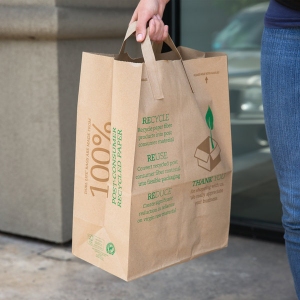
AF&PA Statement of Opposition to New York State Paper Bag Tax AF&PA pointed out that taxing paper carryout bags is a regressive move that wrongfully penalizes a product that is recyclable, easily processed at municipal recovery facilities, compostable, made of recycled material and reusable.
AF&PA pointed out that taxing paper carryout bags is a regressive move that wrongfully penalizes a product that is recyclable, easily processed at municipal recovery facilities, compostable, made of recycled material and reusable.
WASHINGTON, March 27, 2019 - The American Forest & Paper Association (AF&PA) underscored its opposition to a proposed tax on paper carryout bags currently under discussion as the New York legislature works out its 2019-2020 state budget. AF&PA President and CEO Donna Harman issued the following statement: “Taxing paper carryout bags is a regressive move that wrongfully penalizes a product that is recyclable, easily processed at municipal recovery facilities, compostable, made of recycled material and reusable. Retail stores today have the option to charge for carryout bags or any other in-store service without needing permission from the state. A state-required fee creates state-mandated profits at the expense of customers, particularly impacting low-income New Yorkers.” Paper bags are an environmental success story, made from a renewable resource (trees) and paper recovered from recycling programs. In 2017, 65.8 percent of all paper consumed in the U.S. was recovered for recycling, and the recovery rate has met or exceeded 63 percent for the past nine years. Paper is the most-recycled material in the U.S. today. According to the Environmental Protection Agency, more paper (by weight) is recovered for recycling from municipal solid waste streams than glass, plastic and aluminum combined.[1] Paper recycling extends the useful life of fiber, keeps paper out of landfills, is widely accessible and reduces greenhouse gas emissions. Paper use translates to incentives to plant more trees. Because of the sustainability commitment of the paper industry, more trees are planted each year than are harvested. Well managed forests provide a multitude of environmental, social and economic benefits to thousands of American communities. Forests are also the key to help mitigate climate change due to carbon sequestration and promoting biodiversity. The American Forest & Paper Association (AF&PA) serves to advance a sustainable U.S. pulp, paper, packaging, tissue and wood products manufacturing industry through fact-based public policy and marketplace advocacy. AF&PA member companies make products essential for everyday life from renewable and recyclable resources and are committed to continuous improvement through the industry's sustainability initiative— Better Practices, Better Planet 2020. The forest products industry accounts for approximately four percent of the total U.S. manufacturing GDP, manufactures nearly $300 billion in products annually and employs approximately 950,000 men and women. The industry meets a payroll of approximately $55 billion annually and is among the top 10 manufacturing sector employers in 45 states. Visit AF&PA online at www.afandpa.org or follow us on Twitter @ForestandPaper. SOURCE: AF&PA [1] www.epa.gov/sites/production/files/2015-09/documents/2013_advncng_smm_fs.pdf. |